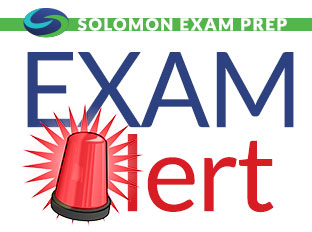This week’s study question from the Solomon Online Exam Simulator question database is now available. Relevant to the Series 7, 24, 62, 65, 79, 82, and 99. –ANSWER POSTED– Continue reading
This week’s study question from the Solomon Online Exam Simulator question database is now available.

Question (Relevant to the Series 7, Series 24, Series 62, Series 65, Series 79, Series 82, and Series 99):
To qualify as a REIT, a company must do all of the following EXCEPT:
Answers:
A. Invest at least 75% of its assets into real estate or cash
B. Distribute at least 90% of its taxable income to shareholders annually in the form of dividends
C. Have a minimum of 100 shareholders after its first year of operation, and no more than 50% of its shares may be held by five or fewer individuals during the last half of any taxable year
D. Derive at least 90% of its gross income from its real estate sources
Correct Answer: D. Derive at least 90% of its gross income from its real estate sources
Rationale: A Real Estate Investment Trust is a company that owns and operates income-producing real estate, such as office buildings, apartments, malls, hotels and resorts. They differ from other real estate companies in that they are required to operate the properties they develop after they have built them, rather than selling them off. Most REITs specialize in a single type of real estate.
To qualify as a REIT, it must:
- Invest at least 75% of its assets into real estate or cash
- Distribute at least 90% of its taxable income to shareholders annually in the form of dividends
- Be a corporation, trust, or association that would be taxable as a domestic corporation except for its status as a REIT.
- Be managed by a board of directors and have ‘unit’ shares that are fully transferable
- Have a minimum of 100 shareholders after its first year of operation, and no more than 50% of its shares may be held by five or fewer individuals during the last half of any taxable year
- Derive at least 75% of its gross income from its real estate sources
- Derive at least 95% of its gross income from those real estate sources mentioned above and dividends and interest from other sources
- Have no more than 25% of its assets in securities of taxable REIT subsidiaries
By annually distributing at least 90% of taxable income to shareholders, REIT income is not taxed at the entity level. This is huge benefit to the REIT. However, because this income has never been taxed, dividend distributions to shareholders are not considered “qualified dividends,“ instead REIT dividends are generally taxed as ordinary income at the investor’s top marginal rate.
Weekly study questions are from Solomon’s industry-leading Online Exam Simulator.
 Effective June 26, 2015, FINRA will alter its rules regarding who will be considered a public or non-public arbitrator. The change will make it so that any arbitrator who has worked in the financial industry for any period of time will be considered a non-public arbitrator. Also, arbitrators who represent investors or the financial industry as a significant part of their business will be considered non-public arbitrators, but may become public arbitrators after a cooling-off period. The cooling-off period lasts five years if they were disqualified from being a public arbitrator based on their own actions. The cooling-off period lasts two years if they were disqualified from being a public arbitrator based on someone else’s actions.
Effective June 26, 2015, FINRA will alter its rules regarding who will be considered a public or non-public arbitrator. The change will make it so that any arbitrator who has worked in the financial industry for any period of time will be considered a non-public arbitrator. Also, arbitrators who represent investors or the financial industry as a significant part of their business will be considered non-public arbitrators, but may become public arbitrators after a cooling-off period. The cooling-off period lasts five years if they were disqualified from being a public arbitrator based on their own actions. The cooling-off period lasts two years if they were disqualified from being a public arbitrator based on someone else’s actions.


